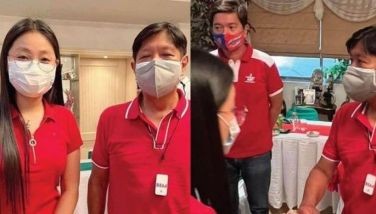4 RP firms developing H1N1 vaccines
MANILA, Philippines - Four pharmaceutical firms in the Philippines are now manufacturing vaccines against the Influenza A(H1N1) virus, the Pharmaceutical and Healthcare Association of the Philippines (PHAP) said yesterday.
PHAP said that research and development for vaccines against Influenza A(H1N1) has entered the production phase and vaccines might be out before November.
PHAP president Oscar
Aragon noted that four PHAP members are involved in vaccine manufacturing.
These are the GlaxoSmithKline, Novartis, Sanofi-Pasteur and Baxter. PHAP is an organization composed of research-based pharmaceutical companies.
“People are working round-the-clock to come up with the vaccines. The development process began when the companies received the ‘seed virus’ from the World Health Organization (WHO) last May. They need that to start the production,” he told The STAR.
The receipt of the virus signals the start of the development process called “passaging” which will eventually yield a “working seed.” Passaging is the process for acclimating the virus to grow in a production environment at optimum yield.
It takes four to six months to produce any influenza vaccine because it will have to undergo the research and development process and the regulatory approval to ensure the safety and efficacy of the new vaccine.
But Aragon claimed that since Novartis and Baxter are using “different technology,” they might have the finished products ahead of time.
He added the companies have been working closely with the WHO, which is monitoring “how the virus behaves or if there is a mutation.”
“Vaccine should be specific to the virus and that is the reason why vaccine production is being done in cooperation with the WHO,” Aragon said.
“As an organization committed to protecting the health and lives of the people, research and development (R&D) to discover breakthrough medicine and prevent this new virus from further spreading is non-stop so that we could lessen the probability of a pandemic,” he added.
But the vaccines would be distributed around the world through the WHO. The GSK will donate some 50 million vaccines while Sanofi-Pasteur will give some 100 million vaccines to the WHO.
“The stocks of vaccines are to be allocated by the WHO. At this point, maybe it’s the Department of Health that’s going to influence the WHO (for the Philippines),” he maintained.
WHO commends DOH chief
Meanwhile, the WHO commended DOH Secretary Francisco Duque III for “his leadership and tireless efforts in responding to this emerging threat to the health of the people of the Philippines.”
In a letter to Duque, WHO director for Western Pacific Dr. Shin Young-soo said the first case of A(H1N1) in the Philippines was “swiftly detected and laboratory confirmation was promptly made at the Research Institute for Tropical Medicines (RITM)” while “contact tracing has also been thorough, allowing the DOH to detect further cases and slow down the spread of the virus.”
“The efficiency of the response indicated to me that the Philippines has the fundamental capacity to detect and respond to the new influenza virus. I should also add that WHO is also confident about the quality of the laboratory diagnoses carried out by RITM and about the epidemiological activities conducted by the National Epidemiology Center,” he maintained.
Shin added that communication between the DOH and the WHO “has been transparent and conducted in accordance with the International Health Regulations (2005).”
Duque announced that the Philippines would adopt the WHO-recommended changes in reporting of A(H1N1).
“The WHO will no longer be issuing global table updates that show the number of confirmed cases for all countries but will instead continue to document the global spread with updates describing the situation in newly affected countries,” Duque said. This means that the DOH will issue updates probably on a weekly basis.
The health chief had reiterated that while the virus has been proven to be mild, the public should not let their guard down. He warned that there are some cases that “become serious” especially if the patients have underlying medical conditions.
“So, again, we are urging the public to be more vigilant in guarding their health against A(H1N1) despite its generally mild clinical manifestations in most of the cases reported in the country,” Duque added.
The DOH said yesterday that 95 percent of the 1,709 cases of Influenza A(H1N1) in the country have already recovered, proving that the virus is “mild in nature.”
Dr. Yolanda Oliveros, director of the DOH’s National Center for Disease Prevention and Control, noted there was also no indication that the virus was mutating.
“According to the WHO, it seems there’s no mutation. It has still the same protein particles, meaning to say if there is resistance (to Oseltamivir), it’s not that much. It could be an isolated case,” she added.
Oliveros said the WHO had instructed countries to monitor “specific resistance” to Oseltamivir.
“So in shifting to mitigation, one of the functions or objectives of getting throat swab (samples) is not only to confirm cases but also to study if there could be some resistance already to Oseltamivir,” she added.
Based on its June 27 update, there were 1,709 cases in the Philippines. A total of 1,568 of them are Filipinos and 235 have history of travel to countries with confirmed cases.
Meanwhile, the Philippine National Police has recorded its first cases of A(H1N1) in four police recruits in Cordillera, but the PNP leadership has already taken measures to prevent the spread of the virus.
In his report to PNP chief Director General Jesus Verzosa, Cordillera Police Regional director Chief Superintendent Orlando Pestaño said the four recruits are confined at the St. Louis University Medical Center.
Meanwhile, seven students tested positive for A(H1N1) virus in Los Baños, Laguna, according to Dr. Alvin Isidro, head of the Municipal Health Office. He said they are already implementing measures to contain the spread of the virus. – With Cecille Suerte Felipe and Rudy Fernandez
- Latest
- Trending




























